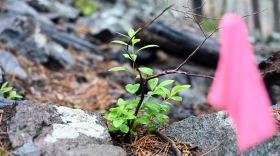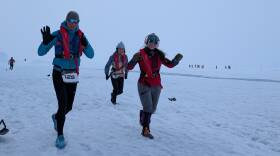-
The trending ‘miracle fix’ for anxiety: Why beta blockers are suddenly everywhere
The heart medication can ease physical symptoms of panic, making them popular for job interviews, public speaking events and more. But experts tell GBH's All Things Considered that beta blockers are not risk-free. -
Aurora borealis seen across Massachusetts
Wednesday night is looking cloudy, but a local astrophysicist says “it’s always worth running out the door and looking, just in case you've got a nice, lucky hole in the clouds.” -
After last year’s fire, volunteers track new life at Blue Hills
Enthusiastic citizen scientists are hiking in each month to document what’s coming back. After more than 40 acres burned, now, there’s a diverse array of plants and birds. -
The Lowell Kinetic Sculpture Race showcases art, creativity and joy — on wheels
Each year, artists, engineers and tinkerers from across New England bring their wacky, human-powered machines to Lowell. -
New NOVA podcast dives into deepfakes’ dangers, life’s origins and everything in between
Host Hakeem Oluseyi, an astrophysicist and author, shares more about the unique science podcast. -
Scientists’ research again in limbo as Supreme Court rules $800 million in funding can be paused
Massachusetts’ attorney general says the ruling is “wrong and deeply disappointing.” -
Gerald Denis: "Save Medical Research!"
Prominent researcher Gerald Denis explains the tight relationship between medical research and progress in medical care. Recent abrupt cuts to research funding and science agencies such as NIH have disrupted research labs, frequently ending carefully designed studies and upending the training of future scientists. We learn how medical discoveries are developed and tested, how research leads to medical advances and dispels false beliefs, and how young scientists’ lab experience prepares them for their careers. Medical research is absolutely necessary for the protection of our health.Partner:Science for the Public -
From a Boston ER to Arctic ice: medicine and marathons in extreme environments
Emergency physician Dr. Luke Apisa describes joining an Arctic expedition to ensure safety for runners pushing their limits on melting polar ice. -
Massachusetts scientists have lost billions in federal funds. Now they have their day in court.
A federal judge in Boston will hear arguments Monday in a lawsuit challenging the Trump administration’s legal authority to terminate billions of dollars in research grants from the National Institutes of Health. -
NEJM editor responds to RFK Jr. calling top medical journals 'corrupt'
HHS secretary says he may block government scientists from publishing in the top medical journals.









